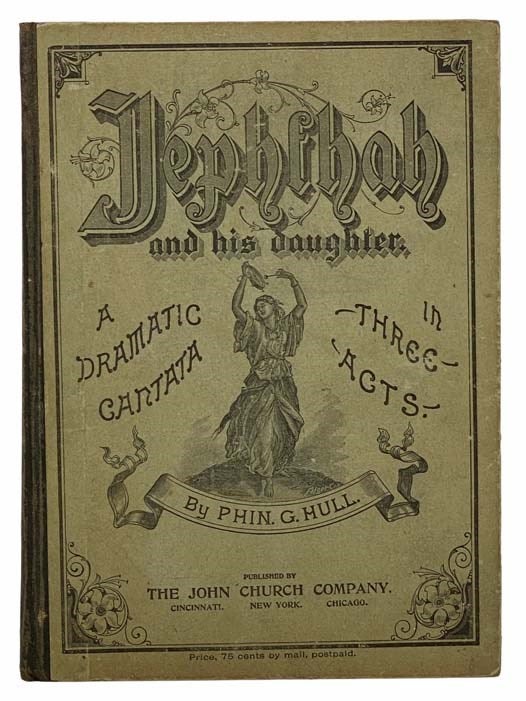
Jephthah and His Daughter: A Dramatic Cantata in Three Acts
Cincinnati: The John Church Company, 1883. Hard Cover. Very Good / No Jacket. Item #2307492
Light general wear.
vi, 79 pp. A dramatic cantata in three acts. "Jephthah (pronounced /ˈdʒɛfθə/; Hebrew: יפתח Yiftāḥ), appears in the Book of Judges as a judge who presided over Israel for a period of six years (Judges 12:7). According to Judges, he lived in Gilead. His father's name is also given as Gilead, and, as his mother is described as a prostitute, this may indicate that his father might have been any of the men of that area.[1] Jephthah led the Israelites in battle against Ammon and, in exchange for defeating the Ammonites, made a vow to sacrifice whatever would come out of the door of his house first. When his daughter was the first to come out of the house, he immediately regretted the vow, which would require him to sacrifice his daughter to God. Jephthah then carried out his vow. Traditionally, Jephthah is listed among major judges because of the length of the biblical narrative referring to him, but his story also shares features with those of the minor judges, such as his short tenure—only six years—in office.[2]"--Wikipedia. "Jephthah's daughter, sometimes later referred to as Seila or as Iphis, is a figure in the Hebrew Bible, whose story is recounted in Judges 11. The judge Jephthah had just won a battle over the Ammonites, and vowed that he would offer the first thing that came out of his house as a burnt offering to Yahweh. However, his only child, an unnamed daughter, came out to meet him dancing and playing a tambourine (v. 34). She encourages Jephthah to fulfill his vow (v. 36) but asks for two months to weep for her virginity (v. 38). After this period of time Jephthah fulfilled his vow and offered his daughter. The majority opinion among commentators is that Jephthah killed his daughter as an act of human sacrifice.[1] There is, however, a minority opinion that Jephthah's daughter spent the rest of her life in seclusion. This is based on considerations such as weeping for her virginity would make no sense if she were about to die (although it would be sensible in light of the Biblical commandment to "be fruitful and multiply", which she would now no longer be able to fulfill). Commentators holding to the minority view include David Kimhi,[2] Keil and Delitzsch,[3] James B. Jordan,[4] and Jehovah's Witnesses.[5]"--Wikipedia
Price: $25.00
